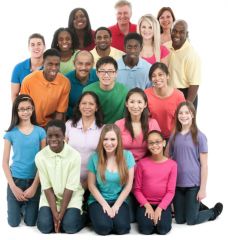Grade Level(s):
- 9-12
- College
Source:
- Smithsonian National Museum of Natural History
Resource type:
- classroom activity
Discipline:
- Life Science
Time: 50 minutes
Overview
This first lesson of the "What does it mean to be human?" sequence sets a scientific frame of mind for students as they begin to explore the question, "What do you think it means to be human?" This lesson sets an important tone by highlighting that other lines of human inquiry outside of science are important for answering this question on a personal level, but the class will focus on a scientific definition of "humanity." Students learn to distinguish questions that could be addressed by the methods of science and those that could not, and they practice applying these criteria.

- [What is science?: Grades ] 9-12
- [What is science?: Grades 9-12] Science aims to build explanations of the natural world. (P3, P6)
- [What is science?: Grades 9-12] Science focuses on natural phenomena and processes.
- [What is science?: Grades 9-12] Science works only with testable ideas. (P2, P3, NOS2)
- [What is science?: Grades 9-12] Moral judgments, aesthetic judgments, decisions about applications of science, and conclusions about the supernatural are outside the realm of science. (NOS8)
- [What is science?: Grades 9-12] Scientists strive to test their ideas with evidence from the natural world; a hallmark of science is exposing ideas to testing. (P3, P4, P6, P7, NOS2)
- [What is science?: Grades ] 13-16
- [What is science?: Grades 13-16] Science aims to build increasingly broad and coherent explanations of the natural world.
- [What is science?: Grades 13-16] Science focuses on natural phenomena and processes.
- [What is science?: Grades 13-16] Science works only with testable ideas.
- [What is science?: Grades 13-16] Moral judgments, aesthetic judgments, decisions about applications of science, and conclusions about the supernatural are outside the realm of science.
- [What is science?: Grades 13-16] Scientists strive to test their ideas with evidence from the natural world; a hallmark of science is exposing ideas to testing.
- NOS Matrix understanding category 2. Scientific knowledge is based on empirical evidence.
- NOS Matrix understanding category 8. Science addresses questions about the natural and material world.
- Science and Engineering Practice 2. Developing and using models
- Science and Engineering Practice 6. Constructing explanations and designing solutions
- Science and Engineering Practice 7. Engaging in argument from evidence
Grade 9-12: This lesson was designed for AP biology.
College: This lesson was designed for AP biology, but would work for college students as well.
